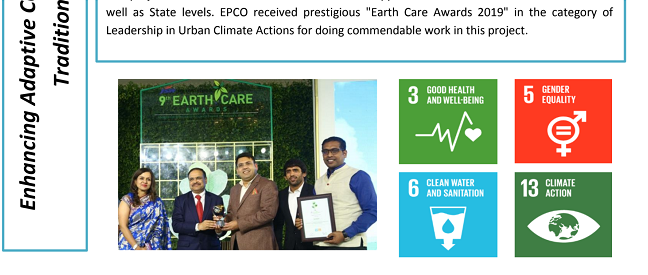Indore Municipal Corporation is working towards conserving and rejuvenating 330 traditional water supply sources (wells & bawdies) of Indore city to enhance adaptive capacity of the city to climate change.
Indore, the cleanest city in India and also the financial capital & most populous city of MP, sits on water demand of 290 MLD. With a projected population of 30 lakh by 2022, the water demand is projected to be around 422 MLD. As the water footprint of the city grows, Indore Municipal Corporation (IMC) caters to its water needs through pumping water from a distance up to 70 km from Narmada River, which cost Rs. 45 per cubic meter water with the counting of unaccounted-for Water (UFW) or the difference between the quantity of water supplied to a city's network and the metered quantity of water used by the customers. Additionally, traditional water supply sources of city got neglected as piped water supply provides water at the doorstep.
Climate change poses unique threats to the Indore water supply system, and Madhya Pradesh Vulnerability Assessment Report specifically highlights that Indore is a vulnerable district with regard to water.
A pilot demonstration project implemented by the Environmental Planning & Coordination Organisation (EPCO) will directly benefit around 16500 households. Indore Municipal Corporation can save revenue worth Rs. 5.66 crores annually through reduced water pumping costs leading to reduction in greenhouse gas emissions through reduced pumping and reduce the load on existing water supply system.
The project supported by the Department of Science & Technology and Ministry of Environment, Forest & Climate Change (MoEFCC) Govt. of India under Climate Change Action Programme involves community engagements for effective management of water sources by developing sense of ownership & responsibility among the local population. EPCO has also been trying to make efforts towards addressing the Sustainable Development Goals 2030.
A Climate Resilience Strategy for Indore city was developed as a part of Asian Cities Climate Change Resilience Network (ACCCRN), suggests conjunctive management of water resources in the face of climate change. The pilot project will implement the recommendations of this study and also to address the climate concerns.
The project has received accolades and has been appreciated at various forums at national as well as state levels. EPCO received prestigious "Earth Care Awards 2019" in the category of Leadership in Urban Climate Actions for doing commendable work in this project.































